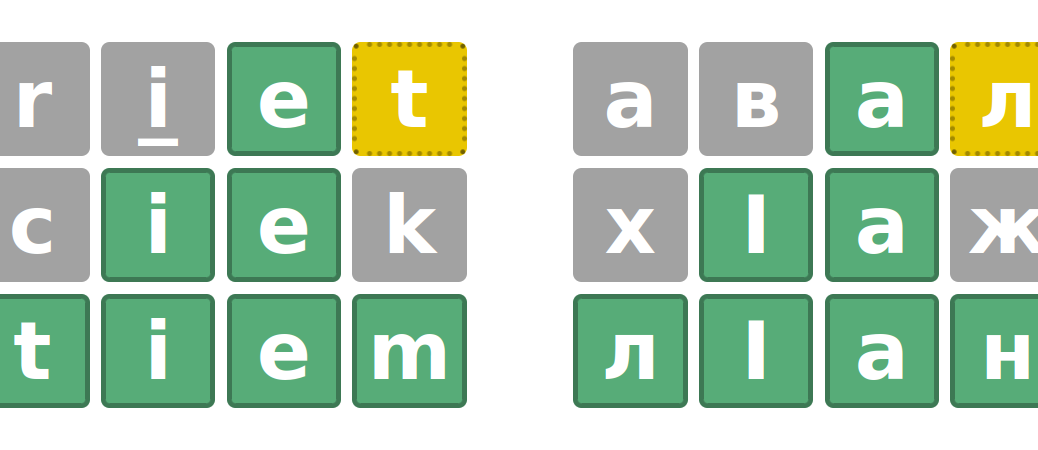
Word games
You have very certainly heard about Wordle, the viral word game by powerlanguage, recently bought by the NYT. In the original game, a 5-letter English word is secretly chosen every day, which players attempt to guess in 6 tries. Each guess is answered by colored cues: green for “correct letter in the correct place”, orange for “correct letter in the wrong place”, gray for “incorrect letter”. The concept of wordle is not new, and resembles games such as Jotto, Lingo, and mastermind.
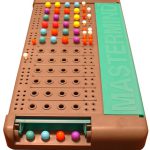
While some may have been annoyed by the endless stream of three-color square emojis reporting players’ success and inundating social media I have been delighted by the productivity displayed by the many variants: in hello wordl, play an endless number of games; in dordle, quordle, octodle guess several words at once; in squardle, play in two dimensions; in nerdle, guess a mathematical formula; in absurdle, the games does its best to get away from your guesses, etc.
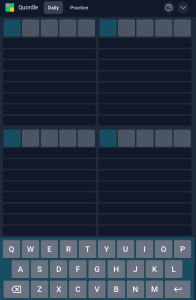
Some derived games transform the game mechanics, but the simplest variation is to switch the vocabulary (have you tried queerdle or lordle of the rings?) or the language. Indeed, wikipedia already references more than 40 wordle language variants. If I believe my social feeds, many linguists have found that they were able to play in languages that they didn’t speak, provided that they had some intuitions of the phonotactics and orthographic sequences. I was however quite disappointed to see that many versions retained the English-centric 1-letter:1-unicode-character, and avoided diacritics altogether, leading to strange impoverished typography — this is the case for example of the French wordle, “le mot”.
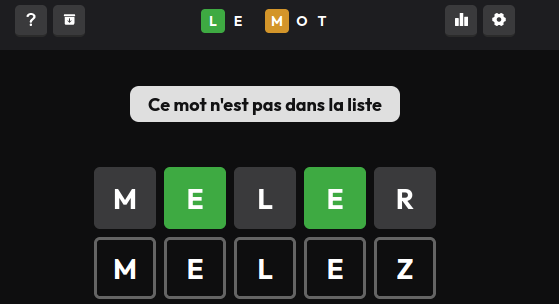
While playing variants, I realized that a wordle is only as good as its word list: some games rely on lexicons which contain only citation forms (infinitives for French verbs) and exclude the many others inflected forms, leading to a frustrating game experience. For example, in Le Mot, one can play mêler (or more exactly, meler) “to mix”, but not meles “(you) mix”. It happens that well curated words lists including inflected variant is a Surrey Morphology Group specialty: lexicons and dictionaries are a common product of language documentation, and as its names indicates, researchers at the SMG have a particular focus on morphology. We have been maintaining open inflectional databases since the 90s. After discussion, we agreed collectively to start by producing two wordle-like games, corresponding to the two main lexicons in the SMG databases, respectively the Dictionary of Archi and the Nuer Lexicon.
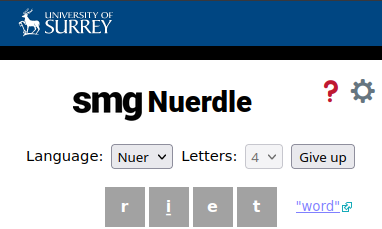
The Nuer language, or Thok Nath, is a West Nilotic language spoken by approximately 900,000 to two million people in South Sudan and Ethiopia, as well as in diaspora communities throughout the world. The SMG has created an interactive online dictionary for it. From this lexicon, I have extracted 6218 words, mostly verbs and nouns, with a few other part of speech represented. All targets are taken from this set of words. However, using only the lexicon would risk rejecting a lot of words the speakers might know, even though they are not documented in the lexicon. Thus, I also extracted all of the words from the Nuer translation of the Bible1. This led to a total lexicon of 13476 words2.
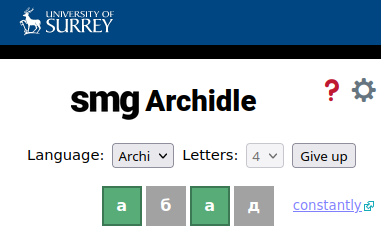
Archi is a Daghestanian language of the Lezgic group spoken by about 1200 people in Daghestan. At the SMG, we created a dictionary of Archi, with entries in Russian, English, and Nuer (both orthographic and phonetic forms), from which I extracted 3626 words for our wordle puzzle. For now, we do not have any more words for Archi, but we are working on it. In the game, we have ignored the stress diacritics, which might not be intuitive enough for speakers.

In order to create the SMG wordles, I started from the open source code of the re-playable version, hello wordle. In order to keep the game closer to its original, I removed the re-playable function. However, I did keep the option to play a range of word length from 4 to 7 letters. Each day, you can thus play 4 games in each language. A main challenge was that the Nuer orthography comprises diacritics, which required rewriting large parts of the game, as it previously assumed that each letter could be written with a single character. Another difficulty came from the fact that neither language has a unique, widely used, keyboard layout. For Nuer, we created one based on a mobile keyboard, which we extended to include more diacritics.

In both cases, we strove to make the game playable by learners, linguists, and curious people who do not speak Archi or Nuer. For this reason, we made the default word length 4 letters rather than 5, to make the game easier. Moreover, we added short English definitions for all words in our lexicons, with links to their full definitions in our resources. Words in Nuer from the bible are not always present in our Nuer lexicon, and hence, some words in Nuer can appear without translations. Finally, in order to help beginners get started, we provide a few example words of the correct length each day, hidden by default, which can be used to start playing.

Besides learning the languages, scouring the dictionary, or using the words given as hints daily, how can you get better at the Nuer or Archi wordle ? It helps to pay attention to the frequency of each letters, and try to play words with frequent letters, in order to reduce the pool of potential words quickly. For the English wordle, some have calculated the optimal starting word. Rather than risk spoiling the game, I provide below the relative frequencies of each of the 5 most frequent letters, for each position (1 to 7) in Nuerdle and Archidle words. This should give an idea of frequent letters at each position. The colors are assigned according to overall frequency in the lexicon, with light greens more frequent than dark blues. Each bar represents the frequencies of the five most frequent letters in a word position (from 1 to 7), ignoring the other, less frequent letters. Each stacked colored bar’s height, between two white lines, represents the letter’s frequency: eg. in Nuer, a word in our lexicon starts with k around 10% of the time, and with t around 12% of the time. If there is some interest, a future blog post could explore further the frequent sequences and letter patterns in either languages.
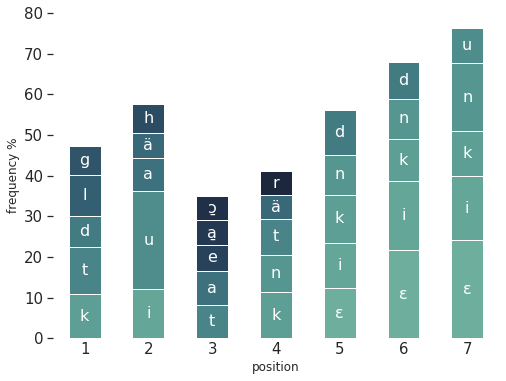
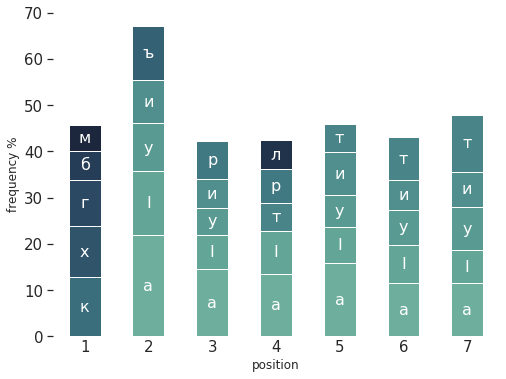
Finally, since this is a morphology blog, I would like to draw your attention to the interesting way in which English acquired a new -dle suffix. The original game is called wordle, a combination of the creator’s last name Wardle, and of word. As the game became viral, the apparent suffix has come to mean “game in the wordle family” (or maybe “online guessing game”). Interestingly, even though the most obvious decomposition of wordle seems to be word+le, the productive suffix is -dle, not -le. Could this be because the family resemblance in the new words is more obvious by keeping more common material ? Isn’t analogy mysterious? In any cases, after hesitating with ri̱etle (from ri̱et “word”+le, in Nuer) and č’atle (from č’at, “word” in Archi), we settled instead on calling our games Archidle and Nuerdle.
- excluding words starting with a capital, in order to avoid proper names. [↩]
- If you want to suggest missing Nuer words, the Nuer lexicon has a module for suggestions ! [↩]